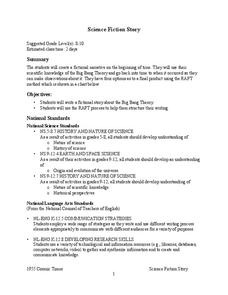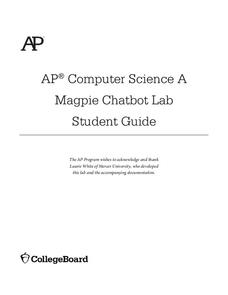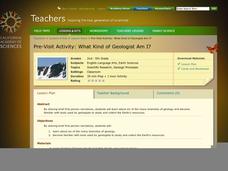NASA
Things Are Not Always What They Seem
Science is magic that works. Magical color-changing beads and a coffee can that follows voice commands are just two examples of magic tricks that rely on science. After completing a hands-on activity and an experiment investigating the...
Baylor College
Pre-Assessment Activity: What Do You Know About Microbes?
In an introductory activity, youngsters take a pre-assessment quiz, get a grasp of a gram of mass, and then estimate the mass of microorganisms that live within a human body. Using Glo Germ™, a material that allows you to simulate the...
Baylor College
What Makes Water Special?
Get close up and personal with a drop of water to discover how the polarity of its molecules affect its behavior. Elementary hydrologists split and combine water droplets, and also compare them to drops of oil. Much neater than placing a...
NOAA
What Little Herc Saw
See the underwater world through a different pair of eyes! Middle school marine biologists identify deep-sea organisms by examining images taken by an ROV from the Okeanos Explorer. After determining what creatures lie beneath the...
NOAA
Mud is Mud...or is it?
We know that the type of soil varies by location, but does the seafloor sediment also vary, or is it all the same? Scholars compare photos of the seafloor from two different locations: the Savannah Scarp and the Charleston Bump. Through...
Curated OER
Arkansas' Top Ten Events of the Century....Says Who? Why? Deciding What is Important in History
Middle and high schoolers work in small groups to compare four different lists published in the Arkansas Times newspaper which chose the "top ten" Arkansas news events of the 20th century. Learners look for similarities and differences...
Foundation for Water & Energy Education
How is Flowing Water an Energy Source? Activity A
Here is a fun little exploration of the potential energy potential of falling water. Learners drop water from various heights using a straw, and they analyze the diameter of the splash. Pair this with two more activities of the same...
Computer Science Field Guide
Computer Science Field Guide
Imagine computer science all summed up in one book. This resource provides 16 chapters that cover many aspects of computer science, ranging from algorithms to software engineering. The e-book contains links to applets to help explain...
Curated OER
Unit 1: Water is Life: The Heart and Science Behind this Phrase
Water, water, everywhere — but will there be enough to drink? Check out these detailed lesson plans to meet NGSS water cycle and CCSS literacy standards in your science classroom. Learners do a close reading of a challenging, poetic text...
NASA
Science Fiction Story
A instructional activity allows you to go back in time and see the big bang actually happen. Bazinga! In reality, pupils research the Big Bang Theory and theorize what it would be like to go back in time and see it happen....
American Museum of Natural History
What's the Big Deal About Paleontology?
Paleontologists could be considered detectives of the past. A quick online lesson describes the science of paleontology and the importance of fossils. Young scientists read about how paleontologists analyze the features of fossils to...
Teach Engineering
What is Going on with Grandma?
Pupils individually determine what they need to know about osteoporosis and how they will find that information. They share their thoughts with a partner before moving on to share with the class. The class arrives at a list of a set of...
NOAA
Introduction to the Ocean Sciences
Engage your class with a mock National Ocean Sciences Bowl. The first installment of a 23-part NOAA Enrichment in Marine sciences and Oceanography (NEMO) program provides an introduction to the ocean sciences, as well as to the rules of...
College Board
AP® Computer Science A: Magpie Chatbot Lab Student Guide
How is your computer or phone able to talk to you? Explore the tasks needed for a computer to understand human voice input and then write code for a Chatbot with this lab guide.
Columbus City Schools
What’s Up with Matter?
Take a "conservative" approach to planning your next unit on mass and matter! What better way to answer "But where did the gas go?" than with a lab designed to promote good report writing, research skills, and detailed observation....
Newspaper Association of America
Cereal Bowl Science and Other Investigations with the Newspaper
What do cereal, fog, and space shuttles have to do with newspapers? A collection of science investigations encourage critical thinking using connections to the various parts of the newspaper. Activities range from building origami seed...
Baylor College
What's Is Soil Made Of?
It's time to roll up those sleeves and get a little dirty in the second lesson of this series on the science of food. Investigate where plants and animals get the minerals they need to live in this two-part exploration of soil. First,...
University of Notre Dame
Safe Science Lab Safety Awareness
Prepare young scientists for the ins and outs of lab safety with a thorough list of symbols, icons, and rules about staying safe during experiments. Additionally, the resource provides several assessment pages for kids to reflect on what...
College Board
2003 AP® Computer Science A Free-Response Questions
You deserve a C++. Released items from the last year of C++ programming for the AP Computer science course provides opportunities to practice. Pupils use the questions to develop their programming skills by finding solutions to the...
Wind Wise Education
Where is it Windy?
How is the wind up there? The class builds a topography model using materials available in the classroom, then place wind flags in different locations on the landscape. Using a fan as a wind source, pupils collect data about how wind...
Curated OER
What is Science?
Students explore physical science by conducting a plant experiment. In this scientific method lesson plan, students discuss questions scientists ask in order to properly explore certain subjects. Students utilize two plants and place one...
Curated OER
Glenbrook South High School Science Scoring Rubric: Student Laboratory Reports
Here is an unexpected, but practical resource. It is not a activity, but rather an outline of what a science laboratory participant should include in a report. Especially valuable is a grading rubric that spells out what is expected for...
California Academy of Science
What Kind of Geologist Am I?
Transform your class into young geologists as they learn about six different branches of geology. Using the included geology career descriptions and picture cards, learners work in small groups deciding which tools and locations fit...
Scholastic
Study Jams! Waves & Currents
Ocean lovers hang ten as they watch this film about waves and currents. What causes waves? What is a current? Learn this and more from Sam as he explains why RJ was struggling to surf the gnarly waves. Have your class watch this at home...
Other popular searches
- What Is Science
- What Is Science?
- What Is Earth Science
- What Is Environmental Science
- What Is Science Important
- What Is Physical Science
- What Is Life Science
- What Is Science Worksheets
- What Is Work in Science
- What Is Science Fiction
- What Is Earth Science?
- What Is Science Worhsheets























